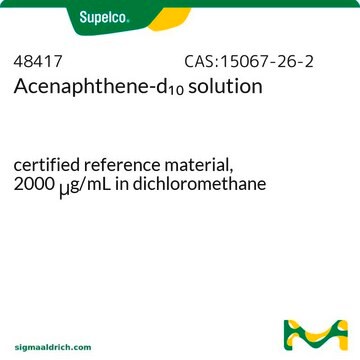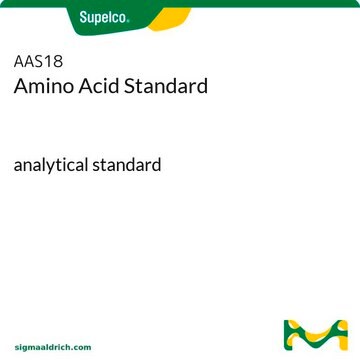50200
Gly-Gly
≥99.0% (NT), suitable for ligand binding assays, BioXtra
Synonym(s):
Diglycine, Glycyl-glycine
About This Item
Recommended Products
product name
Gly-Gly, BioXtra, ≥99.0% (NT)
product line
BioXtra
Quality Level
Assay
≥99.0% (NT)
form
powder
technique(s)
ligand binding assay: suitable
ign. residue
≤0.1% (as SO4)
loss
≤1% loss on drying, 110 °C
color
white
useful pH range
7.5-8.9
pKa (25 °C)
8.2
mp
220-240 °C (dec.)
solubility
H2O: 1 M at 20 °C, clear, colorless
anion traces
chloride (Cl-): ≤50 mg/kg
sulfate (SO42-): ≤50 mg/kg
cation traces
Ca: ≤10 mg/kg
Cd: ≤5 mg/kg
Co: ≤5 mg/kg
Cr: ≤5 mg/kg
Cu: ≤5 mg/kg
Fe: ≤5 mg/kg
K: ≤50 mg/kg
Mg: ≤5 mg/kg
Mn: ≤5 mg/kg
Na: ≤50 mg/kg
Ni: ≤5 mg/kg
Pb: ≤5 mg/kg
Zn: ≤5 mg/kg
SMILES string
NCC(=O)NCC(O)=O
InChI
1S/C4H8N2O3/c5-1-3(7)6-2-4(8)9/h1-2,5H2,(H,6,7)(H,8,9)
InChI key
YMAWOPBAYDPSLA-UHFFFAOYSA-N
Looking for similar products? Visit Product Comparison Guide
Biochem/physiol Actions
Storage Class Code
11 - Combustible Solids
WGK
WGK 3
Flash Point(F)
Not applicable
Flash Point(C)
Not applicable
Personal Protective Equipment
Certificates of Analysis (COA)
Search for Certificates of Analysis (COA) by entering the products Lot/Batch Number. Lot and Batch Numbers can be found on a product’s label following the words ‘Lot’ or ‘Batch’.
Already Own This Product?
Find documentation for the products that you have recently purchased in the Document Library.
Our team of scientists has experience in all areas of research including Life Science, Material Science, Chemical Synthesis, Chromatography, Analytical and many others.
Contact Technical Service






